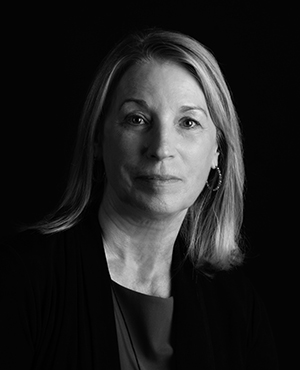 By Marsha Ternus, as told to Tim Paluch
By Marsha Ternus, as told to Tim Paluch
Marsha Ternus was the chief justice of the Iowa Supreme Court in 2009 when the court’s ruling in Varnum v. Brien legalized same-sex marriage in Iowa. The groundbreaking decision ultimately cost Ternus her position on the court, as Iowans voted against her retention the following fall. Ternus continued to practice law and, from August 2013 to June 2016, served as the director of the Harkin Institute for Public Policy and Citizen Engagement at Drake University. Now semiretired—she does legal consulting and serves as a private arbitrator or adjudicator in civil disputes—the 65-year-old Ternus reflects on a distinguished law career, the fallout from the Varnum case, and living life to the fullest.
Find a career that challenges you
I grew up on a farm in eastern Iowa. It’s in northern Benton County. I went to elementary school in Urbana, and I went to high school in Vinton. I was the oldest of six kids. We all had a pretty good work ethic, and we still do.
Becoming a lawyer didn’t even occur to me until I was out of college and working. I studied home economics at the University of Iowa; my focus was clothing and textiles.
I moved to Des Moines and took a job at a savings and loan association. I was a teller and I didn’t really like that work at all, so I just had to sit back and decide, “What am I going to do with my life?”
My main desire was to find work that would be intellectually challenging. I remember thinking, “My brain cells are dying by the minute from lack of use.”
I did not know any lawyers; I did not know any judges. I just thought it would be an intellectually challenging career.
Life is never simple. There is always a balance that must be struck between the security of what you have and the desire for something more fulfilling. Everyone has to strike that balance for themselves.
My parents were supportive of me going to law school. My parents were just great parents, very loving parents. And they expected us to be good people and upstanding citizens, and beyond that, they were supportive of whatever made us happy.
Recognize and pursue your desires
I loved the law from the beginning. I loved everything about it. I felt like I was just born to do it. I wanted to go into private practice. I interviewed with some firms here in Des Moines, and I joined the Bradshaw Law Firm.
Back then people didn’t really change jobs. It was anticipated when a new attorney joined a law firm that they would retire from that firm. Now I think there is much more fluidity among firms, but that was not the culture in the ’70s at all.
I really liked litigation. Back then there were more opportunities for associates to do meaty projects than what I understand is the case now. So it was a really nice time to be a young attorney.
I didn’t feel that I was on a ladder. I had no ambition to do anything beyond practicing law with that law firm.
As I continued to practice law, representing clients whose cases came to us through their insurance company claims, I felt a lack of fulfillment. It was intellectually challenging and a demanding job, but I began to think, “What’s the meaning of this? How am I contributing? What do I need to feel fulfilled?”
And as with many changes in life, there were several factors that converged, including having a third child. And the relative inflexibility of a trial schedule was becoming more problematic for me. I wanted more family time; I wanted more control over my schedule.
It’s very hard to have kids, and nearly impossible to do with both parents having demanding jobs. I look back on it, and I don’t know how we did it.
Be aware of the impact you make
My last child was born in 1992. I was looking for fulfillment in my work and for more control over my work, and a vacancy came up on the Iowa Supreme Court. I had always loved researching and writing. I loved that intellectual process of researching and analysis and communication.
You just apply to the Iowa Supreme Court. A vacancy is announced, and you send in an application. You are interviewed by the state judicial nominating commission. The commission sends three names to the governor, and the governor has 30 days to appoint the new judge from one of those three nominees.
The governor called me (in 1993). I was in my office. At that point you know.
I felt like I was born to be on the Iowa Supreme Court. I felt like, “Wow, I am the luckiest person because I have found work that is perfect for me.”
You feel the weight of what you’re doing in every case. I don’t think people understand how heavy a burden members of that court bear. Every single day. I think in large part that’s because of the finality of it. Also because you are impacting real people in very important ways. There is no way to get around the significance of the work that you do when you’re on the court. And it weighs on a person.
Stand strong in the face of adversity
In the spring of 2009, the Iowa Supreme Court unanimously decided, in the Varnum v. Brien case, that the state’s opposition to same-sex marriage violated the equal protection clause of the state constitution. The ruling established same-sex marriage in Iowa, becoming front-page news across the nation and setting off a wave of rulings over the next few years.
All of us knew that it was a case in which the public had more interest than other cases that we had decided. At the same time, it was a case that had to be heard and decided just like any other case.
I had a practice of not reading articles about matters that would end up in our court so I didn’t have any skewed impressions outside of the record. So while I knew this case was on its way to us, I knew nothing about what was really being claimed.
I think we knew that there would be people who would be upset by our decision, and we knew it could come back to those of us on the ballot in the fall, but there was nothing to do about it. So we just let it play out.
(The following year, religious organizations and others opposed to legalizing same-sex marriage flooded Iowa with advertisements in a successful statewide campaign to defeat the retention of Ternus and two other justices in response to the Varnum ruling.)
We could have campaigned, but we didn’t. We felt that the individuals and organizations who were upset with our decision were painting the court and the justices as having made a political decision based on personal agendas, which was absolutely not true. Our concern was that if we got out there and started campaigning to keep our jobs, we would be acting like politicians. Judges don’t do that. And it would be damaging to the court as an institution.I think by the time the actual vote came, I was resigned to not being retained.
Honestly, prior to making the decision, I didn’t think about all the repercussions. I focused on handling the appeal just like I handle every other appeal. You read the briefs, you look at the law, and you come to some preliminary ideas about what the analytical framework is going to be and where you think it is going to take you in terms of the outcome. All that other stuff wasn’t my problem. It would have just been a distraction.
Of course, not being retained was a great disappointment, but I was lucky enough to have the job for over 17 years. I’m not a complainer. It happened. I’m still here; the decision is still here. It didn’t change anything.
Our legal analysis was not criticized because it was right. The opponents just didn’t like the way things came out. And so basically the individuals who campaigned against us for our non-retention were saying to future judges: “Listen, next time one of these controversial issues comes up, don’t reach for the Iowa Constitution. Reach for the Bible, or reach for the latest Des Moines Register poll.”
I do not think it is healthy for our democracy to have judicial independence undermined by removing judges from their positions based on a disagreement with a result of a case that was decided correctly under the law. What the individuals who can influence the process want is somebody who has prejudged the issues. What kind of justice system is that?
Embrace and enjoy the journey
I don’t miss the court, just like I didn’t miss the firm. I loved my years at the firm, but then I had something really good at the court, and I loved my years at the court, and now I have something really good in terms of a new chapter in my life.
After leaving the court, I just relaxed. Did a bunch of things around the house I hadn’t been able to get to. My youngest daughter was still at home, so I could be home when she got home from school every night.
I just enjoyed that last year of being a mom with kids at home. I worked out with my daughter, we got a trainer, we did fun things together.
I have a much richer life and opportunities to do so many more things than when I was on the court, because the court was so all-consuming that my life was much more one-dimensional.
I like to read. My sisters have gotten me into quilting, which brings me full circle back to my home economics and my love of fabrics. I’m just an insatiable purchaser of fabrics. And it’s fun to have that reborn. I’d forgotten about my love of that.
I am so lucky to have had this opportunity for my life, for my career. I’ve met so many interesting people. I have free time, much more time to spend with my family. It’s been marvelous, and I still have a professional life in terms of still doing legal work, so that intellectual challenge that I love is still there.
I was never ambitious. Life just kind of happened to me. I guess outward success was never my motivator. I was always much more selfish; I wanted to just enjoy my life and enjoy my work and be fulfilled.
I think you sell yourself and your life short if everything is always focused on where it’s going to take you versus what it means as you experience it.
I think that expectation puts way too much pressure on our young people. People think there’s this secret key to success. If there is, I’ve never heard of it. I don’t know what it is.
I probably have at least five more good years of work. I just have to see how things go. I enjoy what I’m doing, and when I have other things I enjoy more, then I’ll stop doing it. I guess
I don’t have a plan.
Just live life to the fullest. I’m 65, so I can’t mess around.






